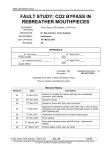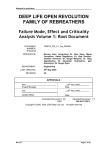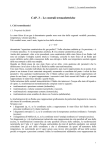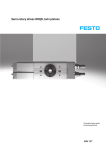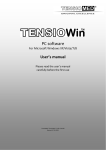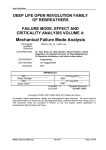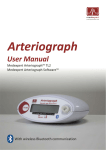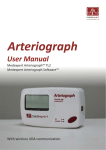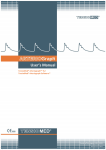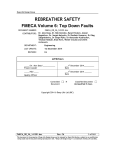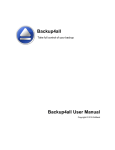Download Open Revolution single scrubber endurance to
Transcript
Baltic Assessment Institute RETEST OF DEEP LIFE INCURSION SRB CO2 SCRUBBER ENDURANCE TO EN14143:2003 AND NORSOK U-101 DOCUMENT: [Filename] ORIGINATOR: DEPARTMENT: LAST UPDATED: REVISION: DV_OR_ScrubberEndurance_Retest_SRB_101215.doc Oleg Zagrebelny, Victor Sudakov Verification 15th Dec 2010 A3 APPROVALS ____Dr. Bob Davidov_____________ Verification Manager ____Dr. Vladimir Komarov__________ Quality Officer ____15th Dec 2010____ Date ____15th Dec 2010____ Date Controlled Document Classified Document DO NOT COPY. Copyright 2010 © Baltic Assessment Institute. This is a controlled document. DV_OR_ScrubberEndurance_Retest_SRB_101215.doc Rev A3 Page 1 of 24 Baltic Assessment Institute Revision History Revision Date A1 9th Dec 2010 A2 A3 Description Test report issued th Combined with VWAI CO2 data. Internal review th Approved for release 12 Dec 2010 15 Dec 2010 DV_OR_ScrubberEndurance_Retest_SRB_101215.doc Rev A3 Page 2 of 24 Baltic Assessment Institute Table of Contents 1 PURPOSE AND SCOPE...........................................................................................4 2 REQUIREMENT ........................................................................................................4 3 EQUIPMENT USED ..................................................................................................5 4 METHOD ...................................................................................................................6 5 TEST RESULTS: ENDURANCE...............................................................................9 5.1 Depth of 6 msw ................................................................................................................................ 9 5.1.1 First scrubber sample ................................................................................................................. 9 5.1.2 Second scrubber sample........................................................................................................... 10 5.1.3 Third scrubber sample.............................................................................................................. 10 5.2 Depth of 40 msw............................................................................................................................. 11 5.2.1 First scrubber sample ............................................................................................................... 11 5.2.2 Second scrubber sample........................................................................................................... 12 5.2.3 Third scrubber sample.............................................................................................................. 12 5.3 Depth of 100 msw........................................................................................................................... 13 5.3.1 First scrubber sample ............................................................................................................... 13 5.3.2 Second scrubber sample........................................................................................................... 14 5.3.3 Third scrubber sample.............................................................................................................. 14 6 TEST RESULTS: VWAI CO2..................................................................................15 6.1 Breath by Breath CO2 Around Breathing Loop ........................................................................ 15 6.1.1 Check of all CO2 levels around the breathing loop ................................................................. 15 6.1.2 Breath by Breath Check from 6m test ...................................................................................... 16 6.1.3 Breath by Breath CO2 Check from 40m test ........................................................................... 17 6.1.4 Breath by Breath CO2 Check from 100m test ......................................................................... 19 7 ANALYSIS ..............................................................................................................22 7.1 Sample Flow rates.......................................................................................................................... 22 7.2 Tabulation of Results .................................................................................................................... 23 7.3 Comparison with previous results................................................................................................ 23 8 CONCLUSIONS ......................................................................................................24 DV_OR_ScrubberEndurance_Retest_SRB_101215.doc Rev A3 Page 3 of 24 Baltic Assessment Institute 1 PURPOSE AND SCOPE The purpose and scope of this report is to provide a retest of CO2 scrubber endurance for compliance with EN 14143:2003 for the Deep Life OR_Incursion model, as previous data on that rebreather had performed the test with the oxygen control switched off to avoid any risk of interfering with the measurement. This is a single scrubber configuration, that has the same scrubber as the Apocalypse model. This document is one in a series that assesses the CO2 scrubber endurance on the Deep Life Open Revolution rebreathers. These include: 1. Scrubber endurance data provided in the User Manual, supported by data in the Scrubber Endurance directory of the PPE Directive Technical File. 2. DV_OR_Scrubber_Endurance_081124.doc providing data for the single scrubber configurations, with particular regard to the sensitivity to low temperatures (1C to 5C), diver attitude and gaps in scrubber use. 3. DV_OR_ScrubberEndurance_DRB_081202.pdf providing data on the dual scrubber configurations. 4. Fault_Study_CO2_Bypass_101209.pdf providing analysis of a fault mode that may affect the apparent scrubber endurance. 2 REQUIREMENT The CE EN14143:2003 and the comparable NORSOK U-101 test, specify the following test conditions: 1. Water temperature is 4+/-1C 2. Carbon dioxide injection rate is 1.6 lpm STPD 3. Breathing simulator rate is 40 lpm 4. Breathing frequency is 20 bpm Scrubber endurance must be measured with < 150ms accuracy and resolution as: • End of inhale CO2 level in the mouth of 5mbar (0.5% SEV) for EN 14143:2003 • End of inhale CO2 in the mouth of 10mbar (1% SEV), also EN 14143:2003 • A further limit that VWAI CO2 does not exceed 20mbar (2% SEV), EN 14143 and NORSOK U101. The depths measured are the worst case profile to: • 6m using oxygen as the make-up gas • 40m using air as the make-up gas • 100m using heliox as the make-up gas The word profile is considered by Deep Life to be unsafe, in that divers may not study the profile where this involves a specific decompression schedule. Deep Life’s definition of the worst case profile is therefore constant depth. With the increase in case diving, and use of rebreathers for bottom phases of a dive, this worst case may be the actual worst case dived. Three scrubbers are measured at each depth. EN14143:2003 requires that the Volume Weighted Inspired CO2 (VWAI CO2) is measured during the endurance test. BAI store all VWAI CO2 for the entire test, breath by breath. DV_OR_ScrubberEndurance_Retest_SRB_101215.doc Rev A3 Page 4 of 24 Baltic Assessment Institute 3 EQUIPMENT USED The test equipment used is listed below. Equipment Serial Number Calibration Next Due DL, Human Respiratory Emulator (Breathing simulator) DL Rev C2 DL 001 Calibrated prior to each use Differential pressure sensor. Druck LPM9381 2393261 Calibrated prior to each use Highly precise digital manometer Keller LEX1 002333 16 July 2011 High pressure sensor ME 705 DL 004 Calibrated prior to each use HA4375847 Against TTi 1906, Serial Number 111474 Prior to test 033624 N/A 7012 23/11/2011 SN 0911243 Uses certified span gases to calibrate at each test CH03 Next hydrostatic Sept 2014 Q440965 Dec 2011 National Instruments Data Capture System PCI-6014 Power supply GPR – 1850 Scales VSP 60/10– 5 Mass spectrometer, Amis 2000 with suitable span gases Deep Life 800 mm chamber, with environmental control, rotateable Hot wire anemometer Note 1: the Breathing Simulator is a complex measurement system and contains additional sensors not listed in the table above. This information is provided at Breathing Simulator Calibration report Cal_Breathing_Simulator_Assessment_090707.pdf. <Remainder of page blank> DV_OR_ScrubberEndurance_Retest_SRB_101215.doc Rev A3 Page 5 of 24 Baltic Assessment Institute 4 METHOD The test fixture used for scrubber endurance tests is shown in Figure 4-3. All operations of the test fixture other than connecting gases are computer controlled and logged. The breathing simulator was calibrated with both NEDU and CE test orifices prior to each test series and following the last test. CO2 is injected as a pure gas, into the breathing simulator. Simulator dead space has no affect whatsoever on the inhaled CO2 waveform: it affects the exhaled CO2 waveform but not the average after the exhale one way valve. Dead space settings of 150ml and 800ml are used routinely; the later allows gas to be extracted from the mouth for sample purposes without changing the VWAI CO2 or End of Inhale CO2 because it inserts a time lag to the exhale cycle during which the mouth CO2 remains at the End of Inhale level. The chamber temperature is kept at 4C by a 2.4KW industrial cooler, providing refrigerated liquid around the chamber. For tests of more than 3 hours, water is exchanged from the top of the chamber, to keep the test at 4C, using bleeding and a hydrostatic pressure test pump. The requirement of EN 14143:2003 is to measure CO2 in the mouth. This is achieved by taking a 1.8 lpm feed from the mouth (at the interface between the mouthpiece and breathing simulator), to a mass spectrometer which records the breath by breath gas fractions with resolution of 70ms for all gases. Where noise is observed at this bleed rate, such as for shallow tests, the bleed rate is reduced until the noise is removed, the bleed rate is not less than 0.6 lpm. The rate of CO2 injection is critical to the test. The injection rate is checked using a variable area sight gauge prior to the test, then monitored throughout the test by: • Mass Flow Controller reading, the mass flow controller having been calibrated using CO2 at NTPD. Temperature compensation is applied manually as will be described. • Mass Flow Meter reading, this being in series with the Mass Flow Controller. • Mass Spectrometer reading of the average CO2 immediately before the scrubber, to ensure this is at least 4% SEV at all times. • Continuous molecular weight monitoring. Precision scales are used to weigh the CO2 cylinder: a twin 20 litre twin-set (40 litres of gas). This is an absolute reference, that is used to monitor the Mass Flow Controller compensation, to ensure it is always within its calibration. The pressure of the CO2 is monitored to determine the temperature of the CO2 being delivered to the Mass Flow Meter and Controller. The maximum pressure of CO2 against temperature is shown in Figure 4-1. This plot is derived from the CO2 pressure – temperature phase diagram shown in Figure 4-2. The low gas temperature means that the Mass Flow Controller is set to 1.75 lpm of CO2 flow: the exact number depends on the gas temperature at the time of the test, but is never less than 1.72 lpm. This is more than the 1.6lpm stipulated in the standards, because the standards use STPD and the MFCs are calibrated with NTPD. A Checklist is used for each scrubber test, prior to the test commencing. The procedures for the setup and execution of the scrubber endurance test is controlled through the BAI Test Manual. DV_OR_ScrubberEndurance_Retest_SRB_101215.doc Rev A3 Page 6 of 24 Baltic Assessment Institute Pressure - Temperature phase diagram for CO2 65 60 Pressure, atm 55 50 45 40 formula table data 35 0 5 10 15 Temperature, C 20 25 Figure 4-1. Gas – liquid phase diagram of CO2 (detail). This relationship enables the mass flow of the CO2 to be compensated for the temperature of the gas, by measuring the pressure of the supply cylinder. Figure 4-2. Gas – liquid phase diagram of CO2. DV_OR_ScrubberEndurance_Retest_SRB_101215.doc Rev A3 Page 7 of 24 Baltic Assessment Institute A Analogue pressure gauges for safety purposes only D Digital gauge with valid calibration Flowmeter PC 3 long time data capturing PC 1 with Real Time controller LPT port Manual pressure regulator D Mass Flow controller 2nd Mass Flow meter Mass Spectrometer PC 2 Datalogging Chamber drain valve 15 ml/min 1.6 l/min at STP 0C MUX Pressure tranducer Differential Pressure w.r.t suprasternal notch A Diff Pressure Water temperature sensor ALV REBREATHER MOUNTED ON MANNEQUIN ALV 1st stage regulator BREATHING SIMULATOR Gas temperature sensor Scales Position sensor Gas temperature sensor 1.6 l/min STP, CO2 at STP 0C, injection point with selectable deadspace w.r.t mouthpiece Counterlung Heater with gas temperature sensor A Suprasternal notch Humidity sensor Gas temperature sensor OPV Solenoid valve for injecting calibration pulses 800 mm CHAMBER Water of 4+/- 1C Counterlung Figure 4-3. Scrubber endurance test fixture. DV_OR_ScrubberEndurance_Retest_SRB_101215.doc Rev A3 Page 8 of 24 Refrigeration System, 2.4KW Baltic Assessment Institute 5 TEST RESULTS: ENDURANCE 5.1 Depth of 6 msw Test condition: Rebreather: Ambient pressure: Ambient temperature: Exhale temperature: BL humidity: Tidal volume: Breathing frequency: Ventilation rate: CO2 injection rate: Make-Up-Gas: 5.1.1 OR rebreather Incursion #2 with PPO2 set at 1.2 atm 6 msw 4+/-1C 32+/-4C above 85% 2 litre 20 min-1 40 lpm 1.6 lpm STPD O2 First scrubber sample Mouth CO2 against Time 10 Mouth CO2 Endurance VWAI 9 8 CO2, %SEV 7 6 5 4 3 2 1 0 0 20 40 60 80 100 Time, min 120 140 160 180 Figure 5-1. Mouth CO2 in the breathing loop against time. Scrubber endurance (5 mbar PPCO2) = 141 min or 2 hour 21 min; Scrubber endurance (10 mbar PPCO2) = 158 min or 2 hour 38 min; Scrubber endurance (20mbar PPCO2) = 177 min or 2 hours 57 min; VWAI reaches the limit of 20 mbar at 170 min. Mass spectrometer calibration was checked online. To decrease the VWAI noise, the gas flow into Mass Spectrometer was decreased slowly from 1.6 lpm to 0.6 lpm during 60..110 min: this is the reason for the spikes in the peak exhaled gas and the VWAI CO2. The CO2 flow rate was not affected. DV_OR_ScrubberEndurance_Retest_SRB_101215.doc Rev A3 Page 9 of 24 Baltic Assessment Institute 5.1.2 Second scrubber sample Mouth CO2 against Time 9 Mouth CO2 Endurance VWAI 8 7 CO2, %SEV 6 5 4 3 2 1 0 0 20 40 60 80 100 120 Time, min 140 160 180 200 Figure 5-2. Scrubber endurance (5 mbar PPCO2) = 160 min or 2 hour 40 min; (10 mbar PPCO2) = 178 min or 2 hour 58 min; (20mbar PPCO2) = 198 min or 3 hours 18 min; VWAI crosses limit of 20 mbar at 193 min. The mass spectrometer calibration was checked online. 5.1.3 Third scrubber sample Mouth CO2 against Time Mouth CO2 Endurance VWAI 9 8 CO2, %SEV 7 6 5 4 3 2 1 0 20 40 60 80 100 Time, min 120 140 160 180 Figure 5-3. Mouth CO2 in the breathing loop against time. Scrubber endurance (5 mbar PPCO2) = 146 min or 2 hour 26 min; (10 mbar PPCO2) = 162 min or 2 hour 42 min; (20mbar PPCO2) = 183 min or 3 hours 3 min; VWAI crosses limit of 20 mbar at 175 min. DV_OR_ScrubberEndurance_Retest_SRB_101215.doc Rev A3 Page 10 of 24 Baltic Assessment Institute 5.2 Depth of 40 msw Test condition: Rebreather: Ambient pressure: Ambient temperature: Exhale temperature: BL humidity: Tidal volume: Breathing frequency: Ventilation rate: CO2 injection rate: Make-Up-Gas: 5.2.1 OR rebreather Incursion #2, with PPO2 set at 1.2 atm 40 msw 4+/-1C 32+/-4C above 85% 2 litre 20 min-1 40 lpm 1.6 lpm STPD N2 First scrubber sample Mouth CO2 against Time Mouth CO2 Endurance VWAI 9 8 CO2, %SEV 7 6 5 4 3 2 1 0 0 50 100 150 Time, min Figure 5-4. Mouth CO2 in the breathing loop against time. Scrubber endurance (5 mbar PPCO2) = 72 min or 1 hour 12 min; (10 mbar PPCO2) = 100 min or 1 hour 40 min; (20mbar PPCO2) = 142 min or 2 hours 22 min; VWAI reaches the limit of 20 mbar at 120 min. The intervals are mass spectrometer calibration checks DV_OR_ScrubberEndurance_Retest_SRB_101215.doc Rev A3 Page 11 of 24 Baltic Assessment Institute 5.2.2 Second scrubber sample. Mouth CO2 against Time 9 Mouth CO2 Endurance VWAI 8 7 CO2, %SEV 6 5 4 3 2 1 0 0 20 40 60 80 100 Time, min 120 140 160 Figure 5-5. Scrubber endurance (5 mbar PPCO2) = 90 min; (10 mbar PPCO2) = 119 min or 1 hour 59 min; (20mbar PPCO2) = 151 min or 2 hours 31 min; VWAI crosses limit of 20 mbar at 135 min. The interval is a mass spectrometer calibration check. 5.2.3 Third scrubber sample Mouth CO2 against Time 10 9 Mouth CO2 Endurance VWAI 8 CO2, %SEV 7 6 5 4 3 2 1 0 0 20 40 60 80 100 Time, min 120 140 160 Figure 5-6. Scrubber endurance (5 mbar PPCO2) = 87 min or 1 hour 17 min; (10 mbar PPCO2) = 114 min or 1 hour 54 min; (20mbar PPCO2) = 152 min or 2 hours 32 min; VWAI crosses limit of 20 mbar at 136 min. The intervals are mass spectrometer calibration checks. DV_OR_ScrubberEndurance_Retest_SRB_101215.doc Rev A3 Page 12 of 24 Baltic Assessment Institute 5.3 Depth of 100 msw Test condition: Rebreather: Ambient pressure: Ambient temperature: Exhale temperature: BL humidity: Tidal volume: Breathing frequency: Ventilation rate: CO2 injection rate: Make-Up-Gas: 5.3.1 OR rebreather Incursion #2 with PPO2 set at 1.2 atm 100 msw 4+/-1C 32+/-4C above 85% 2 litre 20 min-1 40 lpm 1.6 lpm STPD He First scrubber sample Mouth CO2 against Time 9 Mouth CO2 Endurance VWAI 8 7 CO2, %SEV 6 5 4 3 2 1 0 0 20 40 60 80 100 Time, min 120 140 160 Figure 5-7. Mouth CO2 in the breathing loop against time. Scrubber endurance (5 mbar PPCO2) = 105 min or 1 hour 45 min; Scrubber endurance (10 mbar PPCO2) = 136 min or 2 hour 16 min; Scrubber endurance (20mbar PPCO2) = 167 min or 2 hours 47 min; VWAI reaches the limit of 20 mbar at 161 min. The intervals are mass spectrometer calibration checks The hump in the scrubber endurance around 35 minutes is a known phenomena, due to the time taken for the moisture balance to even out. In the worst cases, this can breach the CE ceiling, so is given as an endurance limit in manuals. As can be seen from the plot, the real endurance is over 2 hours at this depth. This is an extremely high performance scrubber. DV_OR_ScrubberEndurance_Retest_SRB_101215.doc Rev A3 Page 13 of 24 Baltic Assessment Institute 5.3.2 Second scrubber sample Mouth CO2 against Time 8 7 CO2, %SEV 6 Mouth CO2 Endurance VWAI 5 4 3 2 1 0 0 20 40 60 80 100 Time, min 120 140 160 180 Figure 5-8. Scrubber endurance (5 mbar PPCO2) = 35 min; (10 mbar PPCO2) = 108 min or 1 hour 46 min; (20mbar PPCO2) = 170 min or 2 hours 50 min; VWAI crosses limit of 20 mbar at 154 min. The intervals are mass spectrometer calibration checks. 5.3.3 Third scrubber sample Mouth CO2 against Time 9 Mouth CO2 Endurance VWAI 8 7 CO2, %SEV 6 5 4 3 2 1 0 50 100 150 Time, min Figure 5-9. Scrubber endurance (5 mbar PPCO2) = 36 min; (10 mbar PPCO2) = 100 min or 1 hour 40 min; (20mbar PPCO2) = 152 min or 2 hours 32 min; VWAI crosses limit of 20 mbar at 138 min. The intervals are mass spectrometer calibration checks. DV_OR_ScrubberEndurance_Retest_SRB_101215.doc Rev A3 Page 14 of 24 Baltic Assessment Institute 6 TEST RESULTS: VWAI CO2 In accord with EN 14143:2003, the Volume Weighted Average Inspired CO2 was measured in the mouth throughout the scrubber endurance tests. The results are presented below. 6.1 Breath by Breath CO2 Around Breathing Loop 6.1.1 Check of all CO2 levels around the breathing loop The CO2 levels at seven points around the breathing loop is checked when the endurance test is set up. An example of the results from this is shown below. CO2 around rebreather during respiration Respiration Mouth EXL Valve Exhale CL SCRB in SCRB out Inhale CL INH Valve 7 6 CO2, %SEV 5 4 3 2 1 0 10 20 30 40 50 60 Time, 70ms sample 70 80 Figure 6-1. . Check of the CO2 flow rates, example taken from the 100m test setup. This shows the breathing simulator stroke (Respiration, Green), CO2 in the mouth (Blue), the CO2 immediately downstream of the exhale valve (Purple), the Exhale Counterlung CO2 (Orange), the CO2 immediately upstream of the scrubber (red), the CO2 immediately downstream of the scrubber (black), the CO2 in the inhale counterlung (light blue), and the CO2 immediately upstream of the inhale one way valve (dark green). This checks the entire fixture and in particular, the CO2 upstream of the scrubber shows the correct fraction of CO2 is being injected: it is 4.46% SEV at BTPD from 4% of tidal gas at SPTD * (273+32)/273. DV_OR_ScrubberEndurance_Retest_SRB_101215.doc Rev A3 Page 15 of 24 Baltic Assessment Institute 6.1.2 Breath by Breath Check from 6m test The CO2 was stored, breath by breath for all tests, with extracts shown below. Mouth CO2 against Time 6 Mouth CO2 Inhale CO2 Endurance VWAI CO2, %SEV 5 4 3 2 1 0 71.22 71.24 71.26 71.28 Time, min 71.3 71.32 Figure 6-2. CO2 sampled at the mouth, showing levels with a highlight of the inhaled part of the respiratory cycle (in green), the end of inhale CO2 represented as the Endurance CO2 (in red), and the Volume Weighted Average Inspired CO2 (in purple),. All curves are shown in the full scrubber endurance curves in the previous chapter. Mouth CO2 against Time 8 Mouth CO2 Inhale CO2 Endurance VWAI 7 CO2, %SEV 6 5 4 3 2 1 0 191.16 191.17 191.18 191.19 191.2 191.21 191.22 191.23 191.24 Time, min Figure 6-3. VWAI CO2 at the 2% SEV point. DV_OR_ScrubberEndurance_Retest_SRB_101215.doc Rev A3 Page 16 of 24 Baltic Assessment Institute Mouth CO2 against Time 7 6 Mouth CO2 Inhale CO2 Endurance VWAI CO2, %SEV 5 4 3 2 1 0 165.14 165.16 165.18 165.2 Time, min 165.22 165.24 165.26 Figure 6-4. 0.5% SEV end of inhale points. 6.1.3 Breath by Breath CO2 Check from 40m test The CO2 was stored, breath by breath for all tests, with extracts shown below. Mouth CO2 against Time Mouth CO2 Inhale CO2 Endurance VWAI 7 6 CO2, %SEV 5 4 3 2 1 0 5.78 5.79 5.8 5.81 5.82 5.83 5.84 Time, min 5.85 5.86 5.87 Figure 6-5. . CO2 sampled at the mouth, showing levels with a highlight of the inhaled part of the respiratory cycle (in green), the end of inhale CO2 represented as the Endurance CO2 (in red), and the Volume Weighted Average Inspired CO2 (in purple),. All curves are shown in the full scrubber endurance curves in the previous chapter. DV_OR_ScrubberEndurance_Retest_SRB_101215.doc Rev A3 Page 17 of 24 Baltic Assessment Institute Mouth CO2 against Time 0.7 Mouth CO2 Inhale CO2 Endurance VWAI 0.6 CO2, %SEV 0.5 0.4 0.3 0.2 0.1 0 5.79 5.8 5.81 5.82 5.83 5.84 Time, min 5.85 5.86 5.87 Figure 6-6. . Zoom into the previous plot showing the data of interest in more detail. Mouth CO2 against Time 9 Mouth CO2 Inhale CO2 Endurance VWAI 8 7 CO2, %SEV 6 5 4 3 2 1 0 131 131.01 131.02 131.03 131.04 131.05 131.06 131.07 131.08 131.09 Time, min Figure 6-7. VWAI CO2 at the 2% SEV point. DV_OR_ScrubberEndurance_Retest_SRB_101215.doc Rev A3 Page 18 of 24 Baltic Assessment Institute Mouth CO2 against Time Mouth CO2 Inhale CO2 Endurance VWAI 7 6 CO2, %SEV 5 4 3 2 1 0 71.82 71.84 71.86 71.88 Time, min 71.9 71.92 Figure 6-8. 0.5% SEV end of inhale points. 6.1.4 Breath by Breath CO2 Check from 100m test The CO2 was stored, breath by breath for all tests, with extracts shown below. Mouth CO2 against Time 5 Mouth CO2 Inhale CO2 Endurance VWAI CO2, %SEV 4 3 2 1 0 10.68 10.69 10.7 10.71 10.72 10.73 Time, min 10.74 10.75 10.76 Figure 6-9. CO2 sampled at the mouth, showing levels with a highlight of the inhaled part of the respiratory cycle (in green), the end of inhale CO2 represented as the Endurance CO2 (in red), and the Volume Weighted Average Inspired CO2 (in purple),. DV_OR_ScrubberEndurance_Retest_SRB_101215.doc Rev A3 Page 19 of 24 Baltic Assessment Institute Mouth CO2 against Time 1.4 Mouth CO2 Inhale CO2 Endurance VWAI 1.2 CO2, %SEV 1 0.8 0.6 0.4 0.2 0 10.68 10.69 10.7 10.71 10.72 10.73 Time, min 10.74 10.75 10.76 Figure 6-10. Zoom into the previous plot showing the data of interest in more detail. Mouth CO2 against Time Mouth CO2 Inhale CO2 Endurance VWAI 7 6 CO2, %SEV 5 4 3 2 1 0 144.29 144.3 144.31 144.32 144.33 144.34 144.35 144.36 144.37 144.38 Time, min Figure 6-11. Extract at point where VWAI CO2 is 2% SEV. DV_OR_ScrubberEndurance_Retest_SRB_101215.doc Rev A3 Page 20 of 24 Baltic Assessment Institute Mouth CO2 against Time 7 Mouth CO2 Inhale CO2 Endurance VWAI 6 CO2, %SEV 5 4 3 2 1 0 107.12 107.13 107.14 107.15 107.16 107.17 107.18 107.19 Time, min Figure 6-12. 0.5% SEV end of inhale points for scrubber 1 Mouth CO2 against Time Mouth CO2 Inhale CO2 Endurance VWAI 6 CO2, %SEV 5 4 3 2 1 0 35.19 35.2 35.21 35.22 35.23 Time, min 35.24 35.25 35.26 Figure 6-13. 0.5% SEV end of inhale points for scrubber 2 DV_OR_ScrubberEndurance_Retest_SRB_101215.doc Rev A3 Page 21 of 24 Baltic Assessment Institute Mouth CO2 against Time Mouth CO2 Inhale CO2 Endurance VWAI 6 CO2, %SEV 5 4 3 2 1 0 35.73 35.74 35.75 35.76 35.77 35.78 35.79 Time, min 35.8 35.81 35.82 Figure 6-14. 0.5% SEV end of inhale points for scrubber 3. The duration in time using the 0.5% SEV limit varies considerably because of the hump in the characteristic. There is considerably less variation in the VWAI CO2 limit of 2% SEV that Deep Life prefers to use, and is supported by the Open Circuit standards (EN 250) and NORSOK U101:1999. 7 ANALYSIS 7.1 Sample Flow rates Test Mouth CO2 amplitude, %SEV to achieve prescrubber 4.5% SEV. Flow in Mass spec. channel, lpm 1 7.5 then 6.8 1.8 then 0.6 2 6.8 0.6 3 6.8 0.6 msw 1 7.5 1.8 2 7.8 1.8 3 7.5 1.8 100 msw, 1 He 2 6.3 1.8 6.2 1.8 3 6.3 1.8 6 msw N2 40 N2 DV_OR_ScrubberEndurance_Retest_SRB_101215.doc Rev A3 Page 22 of 24 Baltic Assessment Institute 7.2 Tabulation of Results Table 1. SCRB endurance and VWAI CO2 level, for 1.6 lpm STPD at 4C, 40 lpm RMV Repeat 2nd 40m test. Test End of Inhale CO2 durations, min 6 msw O2 0.5kPa 141 160 146 72 90 87 105 35 (hump) 36 (hump) 1 2 3 1 2 3 1 2 3 40 msw Air 100 msw Heliox 1kPa 158 178 162 100 119 114 136 108 100 2kPa 177 198 183 142 151 152 167 170 152 VWAI duration, min < 2kPa 170 193 175 120 135 136 161 154 138 7.3 Comparison with previous results The results presented here are in line with those measured by Deep Life or BAI previously. Table 2. Scrubber endurance in Micropore results for 1.6 lpm STPD at 4C, 40 lpm RMV The results presented with the EN 14143:2003 Technical File were Test 6 msw Air 40 msw Air 90 msw Trimix 1 2 1 2 3 4 5 6 1 2 End of Inhale CO2 durations, min 0.5kPa 1kPa 2kPa 165 155 55 57 82 54 68 55 68 85 71 76 93 120 65 74 95 34 32 44 63 The above results are essentially the same as those reported here for 6m depth: no difference is expected between using air and oxygen as the make-up-gas: they have similar density, conductance and permeability, and in any case, the PPO2 control of the rebreather increases the F(O2) considerably when using air. The above results are more conservative than those reported here for the 40m depth because they were carried out by sampling the gas from immediately prior to the inhale one-way valve, at a flow rate that in itself stimulated the turbulent bypass fault reported in the Deep Life document Fault_Study_CO2_Bypass_101209.pdf The Trimix results at 90m are a shorter duration than those here, as the hump in the response is larger. This is expected, as Trimix is a denser gas. DV_OR_ScrubberEndurance_Retest_SRB_101215.doc Rev A3 Page 23 of 24 Baltic Assessment Institute The present results give a basis for claiming significantly longer scrubber endurance than are claimed in the user manual. It is understand that Deep Life have no immediate plans to increase the advised endurance. 8 CONCLUSIONS The endurance results are within the narrow statistical spread of these results, despite earlier results using measurement sample rates that would have created turbulent bypass of the oneway valves. The scrubber endurance and VWAI CO2 results show the presentation of scrubber endurance given in the user manuals for the Apocalypse and Incursion models are conservative. The following durations appear to be the safe limits for the Incursion Rebreather under the EN 14143:2003 test conditions of 40 lpm RMV, 4C water, 1.6 lpm of CO2 injection at STPD: • • • 6m O2 or Air: 40 minutes duration to a 0.5% SEV limit, 3 hour duration to the VWAI 2% SEV limit. 40m Air: 70 minutes duration to a 0.5% SEV limit, 140 minute duration to the VWAI 2% SEV limit 100m Heliox: 30 minutes duration to a 0.5% SEV limit, 150 minute duration to the VWAI 2% SEV limit. At 90m using Trimix, the limits indicated from the previous tests are considerably more conservative, and these should remain. For dive profiles, Deep Life recommend that durations at the various depths are used. For example, a scrubber endurance quoted for a 40m dive profile typically consists of just 20 minutes at 40, at the end of which some breakthrough can be seen, then the depth is reduced to 9m or even less, and the rest of the test is at that depth. Deep Life make the point that divers read that a 90 minute duration quoted on a popular rebreather for a 40m profile, as being a 90 minute duration, but in fact the actual duration at that depth to the CE limit is more likely 30 minutes at that constant depth. By quoting constant depth, the diver can see the endurance at a constant 40m, then if decompression is at 6m, the proportion of the endurance remaining can be determined from the constant depth figure for 6m. In the case of this apparatus, there is a significant difference with depth at the 0.5% SEV limit, but using the Open Circuit VWAI limit of 2% SEV (also the NORSOK U101 rebreather limit is a VWAI 2% SEV limit) then there is no significant difference with depth: the rebreather has a 140min to 180min duration. As the final part of the dive is carried out near 6m depth, then the figure quoted by Deep Life, that the diver does not exceed a 2 hour 45 minute duration for any dive (using the VWAI 2% SEV limit), appears to be reinforced by these test results DV_OR_ScrubberEndurance_Retest_SRB_101215.doc Rev A3 Page 24 of 24
























